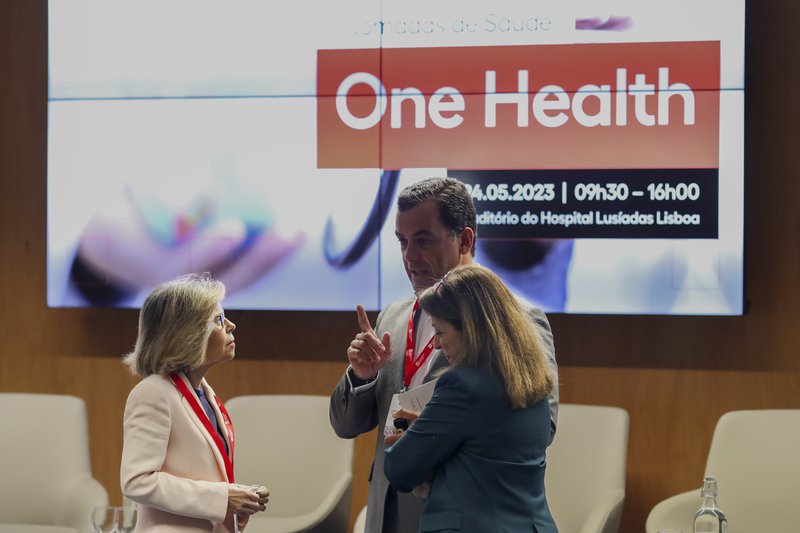
One Health, a theme that is in the agendas of the World Health Organization and of the health professionals, as well as of the academy, was the theme of the II Health Journeys promoted by the European University, in partnership with Lusíadas Knowledge Center, the association responsible for teaching and research of Grupo Lusíadas Saúde, last May 24th, at the Lusíadas Hospital Auditorium, in Lisbon.
Reference specialists in the sector were brought together to address this theme in its various dimensions. "The challenges of One Health and the private sector", "Antimicrobial resistance and emerging threats", "One Health: a new challenge for teaching and research in health" and "Human nutrition and sustainable health" were the themes of the panels.
The event was opened by Hélia Gonçalves Pereira, dean of the European University and Vasco Antunes Pereira, CEO of Grupo Lusíadas Saúde, and by Maria de Belém Roseira, president of the Advisory Board of the European University. The closing ceremony was attended by Daniel Hormigo, Dean of the Faculty of Biomedical Sciences and Health of the Universidad Europea de Madrid, Carlos Bertran, General Director of the European University, and Eduarda Reis, President of the Medical Council of Grupo Lusíadas Saúde.
According to Maria de Belém, "90% of the risk of disease is defined by the environment and only 10% is defined by genes. Genes are part of us, but they are not everything in us". A fact that was verified at the time of the discovery of the genome sequence: "we thought we were going to solve everything and it wasn't so". The former minister of health stressed the importance of new approaches in health, which configure all aspects that involve it, in order to provide a better response to emergencies, as well as new technologies for health, having just one health, the training of human resources and cyber-resilience, since cyber-attacks are a reality and a threat.
On the panels were André Pinto, administrator of Hospital Lusíadas Amadora, Eduarda Reis, president of the Medical Council of Grupo Lusíadas Saúde, Luís Lopes Pereira, country director at Medtronic, and Diogo Gouveia, vice-president of the board of directors of the National Association of Pharmacies (ANF), to talk about the challenges in the private sector.
In the second panel, and to talk about antimicrobial resistance and potential threats, Andreia Duarte, Pharmacy director of Lusíadas Saúde Group, was the moderator, and Helena Farinha, pharmacist of Western Lisbon Hospital Centre, Eduardo Malmierca, professor of Infectious Diseases at the Faculty of Biomedical Sciences of Universidad Europea de Madrid and Paulo Mergulhão, internist of Lusíadas Saúde Group, were the speakers.
The third panel focused on higher education and research in the health area and counted with Ana Rafaela Prado, internist of Lusíadas Saúde Group, as moderator, and Natividad Pérez Villalobos, vice-dean of the Faculty of Biomedical Sciences of the Universidad Europea de Madrid, José Fernandes full professor of surgery, retired from the Faculty of Medicine, University of Lisbon, Miguel Castanho, full professor of Biochemistry, Faculty of Medicine, University of Lisbon, and Pedro Amores da Silva, assistant professor at the ESDH, University of Évora and PhD in Pharmaceutical Sciences.
The final panel focused on nutrition and sustainability in health. The moderator was Alexandra Bento, coordinator of the Nutrition Sciences area at the European University, and the panel included the experience of Helena Real, general secretary at the Portuguese Nutrition Association, Andreia Ferreira, nutritionist at Grupo Lusíadas Saúde, Sofia Couto da Rocha, Smart Aging & Chief Transformation Officer at Grupo Lusíadas Saúde, and Sandra Martins, lecturer in Nutrition and Sport at the European University.
The One Health concept recognises that the health of humans, animals and the environment, including plants, is interconnected and interdependent and is therefore fundamental to addressing the public health challenges of the 21st century. Many infectious diseases affecting humans, such as avian influenza and SARS, originated in animals. The recent global Covid-19 pandemic has also highlighted the fragility of this interconnectivity, making the global health or One Health concept more understandable. It is therefore increasingly urgent to look at One Health as a whole.